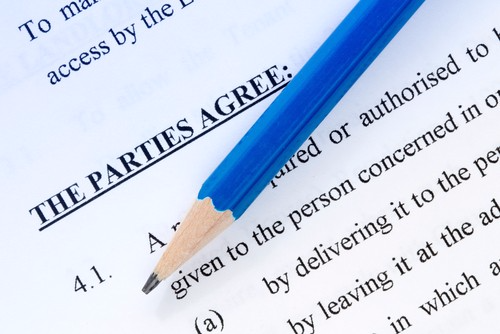If you are a landlord and have questions, read these 4 landlord tenant dispute tips. Then, contact our New Jersey attorneys to get started.
1) Tenant Breaks the Lease
When a tenant breaks a lease, the landlord has access to several remedies. First, the landlord can file a Civil Action against the tenant to seek payment of rent that would have been paid had the tenant complied with the lease. The landlord does, however, have an obligation to mitigate damages. For example, if a tenant breaks a lease with, say, four months left, the landlord can’t simply sue the tenant for the four months’ rent. First, the landlord must make reasonable efforts to rent the premises, and he must be able to document those efforts. Once the landlord makes that effort – but is not successful – he can seek to have the tenant pay all the monies that would have been paid under the lease, had the lease not been broken.
2) Using a Process Server to Perform an Eviction
In all New Jersey eviction cases, once the landlord has been able to obtain a Judgment of Possession – in other words, the court says that the tenant must leave the premises – the landlord must not avail himself of self-help in order to remove a tenant from his property, but must retain the services of a court constable. The court constable is the individual who actually conducts the lockout of the tenant, posts the Warrant of Removal, and subsequently performs the actual eviction. The landlord is prohibited from conducting self-help evictions in the state of New Jersey.
3) Courts That Handle Landlord-Tenant Issues
All landlord-tenant matters are heard in the County Superior Court, in the Special Civil Part Section of the respective county court.
4) Different Type of Tenancies
The state of New Jersey recognizes three categories of tenants – commercial tenants and two categories of residential tenants. New Jersey statute N.J.S.A 2A:18-53A generally addresses tenants that occupy owner-occupied premises where there are no more than two rental units in addition to the one in which the owner resides. Those tenants have far fewer rights than the majority of tenants – those who fall under N.J.S.A 2A:18-61.1. That statute is called the Anti-Tenancy Eviction statute, and for very good reason. The essential purpose of that statute is to protect tenants from unwarranted evictions.
In the first category – the owner-occupied tenancies – the landlord can simply terminate a tenancy once the lease has completed. In the case of a month-to-month tenancy, the landlord can serve a 30-day notice and terminate the tenancy. Under the Anti-Tenancy Eviction statute, however, so long as the tenant pays rent and does not violate the terms of the lease, they cannot be evicted. In other words, the mere fact that a landlord simply doesn’t like the tenant and doesn’t want to continue to be their landlord is not a reason to evict the tenant. The tenant can only be evicted for just cause – and that’s going to be a violation of the lease or failure to pay rent.
Download Our Free Landlord Guide
If you are a landlord and have questions, read these 4 landlord tenant dispute tips. Then, contact our experienced New Jersey Landlord Tenant Attorney Brian Freeman for strong legal help.

